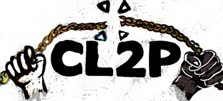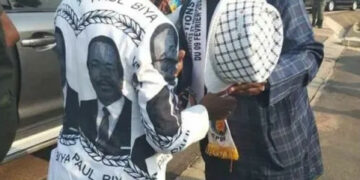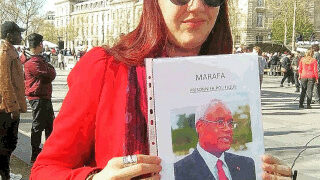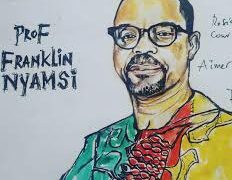Comment Rester Humain au Cameroun

Dans un récent pamphlet intitulé “CAMEROUN: « UNE LUTTE DE NÈGRES DANS UN TUNNEL » contre la mise à feu des régions Anglophone par le Regime Biya de Yaounde, Achille Mbembe ecrit “Après tout, rien ne remplace la technique primitive du feu, cette arme primordiale. Tout revient finalement au feu et à celui qui le maîtrise, qui sait s’en servir contre l’ennemi. Car que vise-t-on au fond sinon à le réduire – lui et tout ce qui soutient son existence – en un amas de cendres.”
Et il continue en s’adressant au pyromane Biya: “Un vieillard fainéant, cynique et jouisseur s’accroche, acclamé par une armée de sycophantes, au final d’une vie consacrée à ne rien faire. Il y a longtemps qu’il est mort – d’autolobotomisation. Seul un corps sans organe git, le corps sans organe d’un pouvoir autophage, qui desormais se dévore tout seul – le principe diabolique par excellence. C’est que le satrape ne veut pas mourir seul. S’il le faut, il emportera tout avec lui.”
Ce qui est important ici, c’est comment Achille Mbembe va au cœur des sentiments et de l’expérience de l’injustice et du concept de souffrance sociale en tant que noyau normatif. Comment les sentiments sont pris pour acquis, mais sont constitutifs de l’être humain et d’une société saine et productive. Ainsi, comment les gens qui n’ont aucun sentiment ne peuvent pas être humain.
On peut ajouter ici le travail d’Axel Honneth sur le pouvoir et les logiques de reconnaissance. En en effet Axel Honneth met l’accent sur des marqueurs non économiques tels que l’amour, le respect et l’estime de soi, des marqueurs non économiques qui sont tenus pour acquis en terme de cohésion sociale. Honneth continue à définir l’amour, le respect et l’estime de soi comme l’ingrédient d’une nouvelle logique de reconnaissance que le sujet peut trouver à travers de nouvelles formes d’autonomie personnelle et associative dans une relation pratique et directe à la justice sociale.
L’identité est elle-même liée aux notions de justice et d’éthique de la reconnaissance. Une dynamique de pouvoir qui rend les gens ordinaires vulnérables aux autres pour la formation de l’identité et la reconnaissance des façons dont le pouvoir établit des règles et des normes qui servent d’intermédiaires à l’individualisation, à l’inclusion sociale et à la réalisation de soi.
Dans l’ensemble, le progrès et la justice ne peuvent être mesurés qu’en termes d’inclusion et de justice sociale.
Il devient clair qu’avec le régime de Yaoundé, obsédé par la question du statut, l’autre n’existe pas en réalité. Par conséquent, il n’y a pas de réciprocité parce que la reconnaissance ne peut être que mutuelle. Dès lors une personne qui est un cannibale et dans un stade avancé d »auto-lobotomie » comme Biya ne peut reconnaître personne d’autre, parce que sa mémoire est morte. Ce manque de reconnaissance exclut toutes les formes de participation égale et de justice sociale dans la sphère publique. Donc, une société ne peut exister sans les autres, à moins que ce soit dans un monde où on marche sur les têtes.
Olivier J. Tchouaffe, PhD, Porte-parole du CL2P
[spacer style="1"]
English version
How to Stay Human in Cameroon

In a recent pamphlet against the burning of the Anglophone regions of Cameroon, titled, “CAMEROON: « A FIGHT OF NEGROES IN A TUNNEL »
Achille Mbembe writes “After all, nothing can replace the primitive technique of fire, this primordial weapon. Everything eventually returns to the fire and the one who controls it, who knows how to use it against the enemy. For what do we aim at, if not to reduce – him and everything that supports his existence – in a heap of ashes.”
He then, goes on the blames the arsonist in chief, Paul Biya, as « A sluggish, cynical and enjoyable old man clings, acclaimed by an army of sycophants, at the end of a life devoted to doing nothing. He died a long time ago – of autolobotomisation. Only a body-less body lies, the body without an organ of autophagic power, which is now devouring itself – the diabolical principle by excellence. The satrap does not want to die alone. If necessary, he will take everything with him.”
What is important here is how Achille Mbembe goes at the core of feelings and the experience of injustice and the concept of social suffering as a normative core. How feelings are taken for granted but are constitutive of being human and the making of a healthy and productive society. Thus, how people who have no feelings cannot stay alive.
One can add in here, the work of Axel Honneth on power and the logics of recognition. Axel Honneth, moreover, puts an emphasis to non-economic markers such as love, respect and self-esteem, non-economic markers that are non-economic but taken for granted in terms of social cohesion. Honneth goes on to define love, respect and self-esteem as the ingredient of a new logic of recognition that the subject can find through new forms of personal and associational autonomy in a practical and direct relationship to social justice, therefore, how the concept of identity is itself related to notions of justice and ethics of recognition. A power dynamic that make ordinary people vulnerable to other for identity formation and recognition for the ways that power sets rules and norms that mediate individualization, social inclusion and self-realization.
In aggregate, progress and justice can be measure only in terms of inclusion and social justice.
It becomes clear that with the regime of Yaoundé obsess with question of status that the other does not exist. Therefore, there is no reciprocity because recognition can only be mutual. A person who is a cannibal and in an advance stage of “auto-lobotomy” cannot recognize anybody else because his memory is dead. This lack of recognition excludes all forms of equal participation and social justice in the public sphere. Thus, a society cannot thrive without the other.
![]()
Olivier J. Tchouaffe, PhD, Spokesman of the CL2P


















